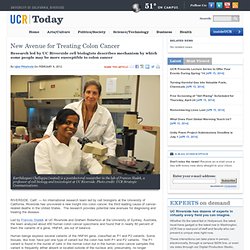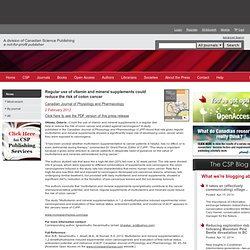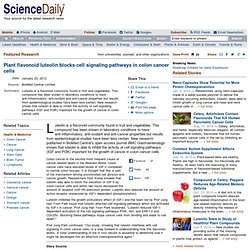

New Avenue for Treating Colon Cancer. Research led by UC Riverside cell biologists describes mechanism by which some people may be more susceptible to colon cancer By Iqbal Pittalwala on February 9, 2012 Karthikeyani Chellappa (seated) is a postdoctoral researcher in the lab of Frances Sladek, a professor of cell biology and toxicologist at UC Riverside.

Regular Use of Vitamin and Mineral Supplements Could Reduce the Risk of Colon Cancer. Ottawa, Ontario –Could the use of vitamin and mineral supplements in a regular diet help to reduce the risk of colon cancer and protect against carcinogens?

A study published in the Canadian Journal of Physiology and Pharmacology (CJPP) found that rats given regular multivitamin and mineral supplements showed a significantly lower risk of developing colon cancer when they were exposed to carcinogens. “It has been unclear whether multivitamin supplementation to cancer patients is helpful, has no effect, or is even detrimental during therapy,” commented Dr. Plant flavonoid luteolin blocks cell signaling pathways in colon cancer cells. Luteolin is a flavonoid commonly found in fruit and vegetables.

This compound has been shown in laboratory conditions to have anti-inflammatory, anti-oxidant and anti-cancer properties but results from epidemiological studies have been less certain. New research published in BioMed Central's open access journal BMC Gastroenterology shows that luteolin is able to inhibit the activity of cell signaling pathways (IGF and PI3K) important for the growth of cancer in colon cancer cells.